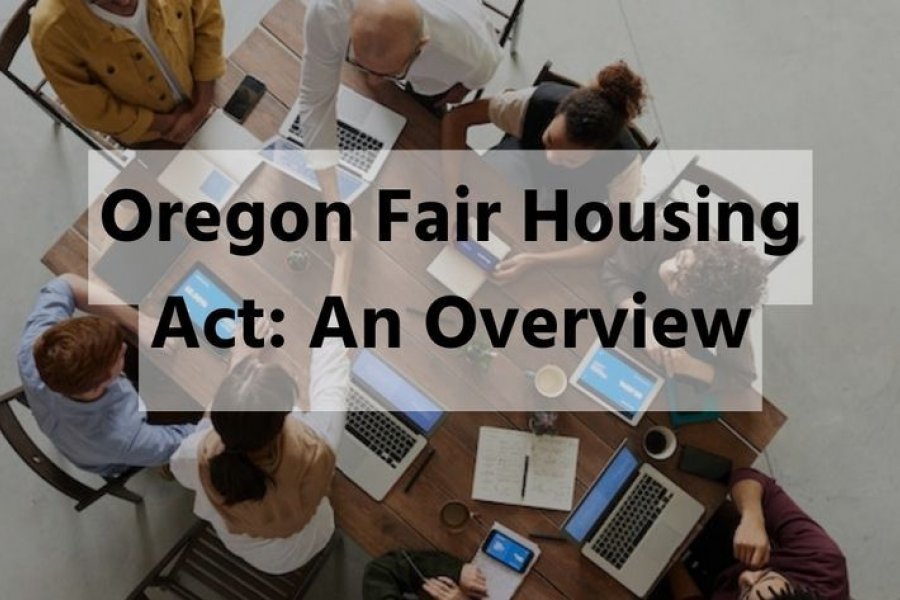
As an Oregon landlord, understanding the Fair Housing Act and respecting the enforcement of it is critical when operating an ethical and successful rental business.
Federal fair housing law protect renters and buyers from illegal rental housing discrimination based on race, sexual orientation, national origin, sex, religion, familial status, or physical or mental disability – meaning it's illegal in Oregon to refuse rent or discriminate against potential renters because of these protected characteristics. Domestic violence victims also have protections when it comes to fair housing, judged by the Fair Housing Council of Oregon.
Furthermore, landlords are also responsible for educating themselves on other requirements under fair housing, such as accessibility laws that aim to improve equal opportunities between residents within your properties. In this blog post, we will discuss the basics of Oregon's fair housing laws so you can stay up-to-date with their responsibilities under Oregon law and avoid recieving any sort of fair housing complaints.
What Is the Federial Fair Housing Act, and What Does It Cover in Oregon Specifically?
The federal Fair Housing Act was passed in 1968 as part of the Civil Rights Act. It prohibits illegal housing discrimination in real estate and housing transactions based on race, national origin, religion, sex, familial status, or disability.
This act applies fair housing to all residential rental sale or renting aspects, including advertising, zoning, mortgage lending, funding, appraisals, homeowner's insurance, and more. It allows people from different backgrounds to live in any neighborhood they choose without fear of illegal housing discrimination or exclusion.
Fair Housing law requires all housing providers landlords in Oregon to provide equal access to housing choice and prohibits illegal housing discrimination. Additionally, the Fair Housing Council of Oregon has expanded its landlord tenant law to prevent housing discrimination beyond what is required by federal law. Furthering fair housing, under Oregon state law, it is also illegal to discriminate against a person in housing based on marital status and sexual orientation.
All and all, it was put in place to ensure fair housing for all persons in the state.

Additionally, as a landlord, you must make reasonable modifications for any person with a mental or physical disability to provide equal access to housing. Furthermore, Oregon has adopted the practice of "source of income protection," which means that you cannot reject an applicant based solely on their source of income (e.g., disability benefits, Social Security). These are all important factors of fair housing.
What Do Fair Housing Laws Prohibit in Oregon?
The FHA, as enacted in Oregon and enforced by the Fair Housing Council of Oregon, prohibits illegal housing discrimination based on certain protected classes. The protected classes under the FHA and enacted by the Fair Housing Council of Oregon are:
Race
The Fair Housing law prohibits housing discrimination against any person based on race regarding real estate transactions, including housing and urban development. This includes making decisions such as denying a person the ability to rent or buy housing, setting different terms and conditions for members of other races, evicting a tenant or rejecting an applicant based on their race, or making statements that indicate racial preferences. It is illegal for anyone to interfere or deny a person access to housing based on their race in Oregon as they are a protected class.
Religion
The FHA also prohibits you from refusing to rent an apartment or house to someone due to their religious beliefs. Making statements that indicate a preference for certain religions over others and setting different terms and conditions for members of different faiths is strictly prohibited as they are a protected class. Fair housing requires you to treat everyone equally.
Gender Identity
The FHA in Oregon does not allow you to deny someone the opprunity to rent because of their gender, either explicitly or implicitly. This includes denying fair housing and suggesting a particular unit is safer for one gender or dangerous for another.

Family Status
A landlord or housing provider cannot deny to rent to a person just because they have children or are expecting a child. Under fair housing, you must also accept any reasonable accommodation request to support the needs of families with young children when it comes to housing and urban development.
It is strictly prohibited to deny rent to tenants with kids over a couple, change the terms of a lease agreement for a family with children, set higher rents or security deposits for those with children, and exclude families from specific amenities or floor plans.
Disability
You must not deny housing or make it difficult for someone with a disability to access the residence, such as not providing accessible parking or refusing to install needed items like grab bars in the bathroom. You must accept any assistance or reasonable accommodation request for those with a disability, such as allowing an service dogl or other assistance animal, installing ramps, or providing accessible parking spaces as they are a protected class.
Not allowing an assistance animal or other reasonable accommodation for a tenant with a disability is also considered discrimination whether the tenant's disability is mental or physical. A reasonable accommodation is needed to be fulfilled in order to give every tenant equal access to the home with reasonable modifications.
Marital Status
This is also a protected class under the Fair Housing law. A housing provider may not deny housing to unmarried couples who live together, nor can you impose additional fees or rents on unmarried couples.
Tips for Landlords to Provide Fair Housing
Here are some tips for you to provide fair housing:
Respect the Rights
Respect all renters' civil rights, regardless of race, gender identity, disability, religion, or national origin or status as a victim of domestic violence. No tenant should be treated differently just for who they are. This includes providing the same amenities and services to everyone, such as parking spaces and access to maintenance services.

Use Non-Discriminatory Language While Advertising
Landlords should use language that is not discriminatory while advertising a rental. Language such as "no children," "suitable for single individuals," substantially limits potential renters based on their protected characteristics and should be avoided.
Provide All the Required Facilities
Be mindful of any special amenities that may be necessary for particular renters, including a physical or mental impairment. Depending on their disability, some renters may need specific services or facilities like wheelchair ramps or special paths. Make sure these services are available and accessible to all persons.
Set Clear Rules
Have a clear and transparent policy that outlines what is expected of both you and your tenants under federal state and local law. This should include rules regarding noise levels, pet policies, smoking bans, etc. So that everyone understands what is acceptable behavior while living on the premises.
Keep Yourself Updated
Be aware of your federal, state and local fair housing laws. Make sure to comply with all local and state laws regarding tenant rights and fair housing. This includes any ordinances or regulations regarding housing discrimination and standards for your relationships with your tenants. Tenants can make a complaint if you do not respect these laws, so stay updated and respect their enforcement.
Listen Carefully to Their Concerns
Make sure to listen carefully to any issues or complaints and take appropriate action if needed. Also, if you have any questions or concerns, it's essential to be open and honest with your tenant.
Bottom Line
As the USA continues to commit to furthering fair housing regulations, it's essential for all rental owners and housing providers to respect tenants' rights and provide the necessary services to everyone. If you have further questions regarding the FHA, or any questions regarding property management, get in touch with the experts at Campus Connection!
We can help with marketing, maintenance, tenant screening, ensuring the Fair Housing Act is being followed, and much more! Learn more about our services today!
This blog should not be used as a substitute for legal advice from a licensed attorney in your state. Fair housing law can change, and this post might not be updated at the time of your reading. Please contact us for any questions you have in regards to this content or any other aspect of your property management needs.
